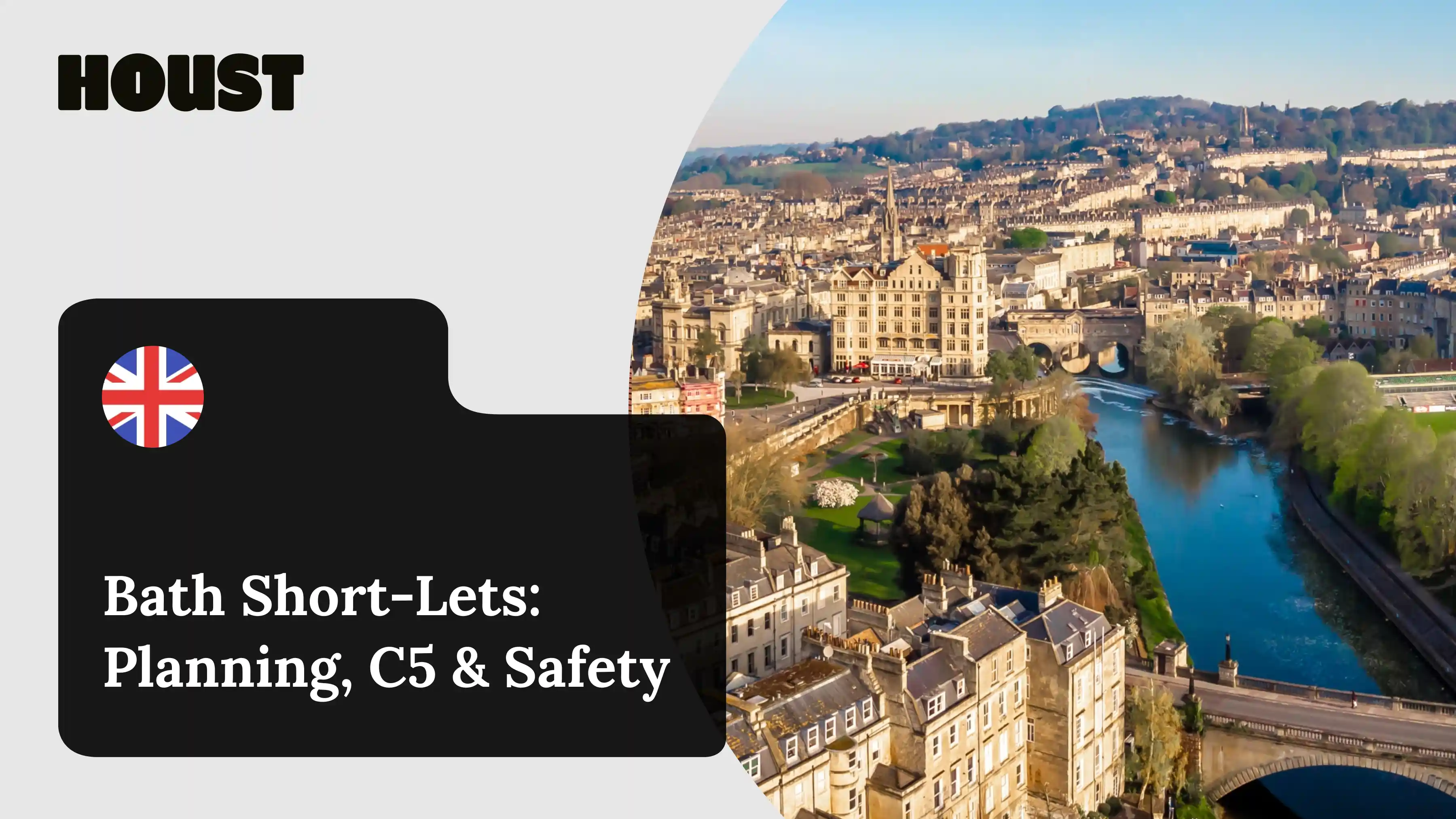TL;DR
- Bath has no citywide night cap. London’s 90-night rule does not apply here.
- Entire-home short-lets are assessed under planning and can be treated as a material change of use, often against C1 policies, case by case.
- England has confirmed a new C5 use class and a mandatory national register, but neither has commenced yet.
- Hosts must complete a fire risk assessment and keep it under review.
- If your property is available for at least 140 days and actually let for at least 70 days in the previous 12 months, it may be assessed for Business Rates instead of Council Tax.
Table of Contents
Is short-term letting legal in Bath in 2025?
Yes — but it’s planning-led. Using a normal dwelling (Use Class C3) as an entire-home holiday let/serviced accommodation can be a material change of use, assessed case-by-case against intensity, amenity impact, access/servicing and local policy context (including Bath’s World Heritage setting). In practice many LPAs reference C1 policies when assessing whole-home STRs. Always check recent decisions or seek pre-app advice.
What’s changing nationally (confirmed, not yet commenced)
England has confirmed a package for short-term lets:
- A new use class (C5) for STRs and planning permission for future STRs where applicable.
- A mandatory national register of short-term lets.
- Proposal that homeowners can let their main home up to 90 nights without planning.
Status: implementation depends on secondary legislation and local adoption; councils may later use Article 4 to withdraw any permitted development (PD) between C3↔C5 in defined areas.
What this means for Bath hosts
- Expect a clearer planning status for entire-home STRs (C5) once commenced.
- Be ready to register and display a registration number when the national scheme opens.
- Watch B&NES updates; Article 4 could be used locally to restrict PD in specific areas.
🚀 Build a Thriving Airbnb Business with Houst
Monetize short-term rentals without owning property. Our Airbnb Business Partnership Program helps you start, scale, and automate a profitable Airbnb business with smart pricing, automation, and expert support.
💡 No Property Needed
📈 Expert Growth Strategies
🤖 Automated Hosting Tools

⭐ Rated 4.8/5 by 2,500+ Hosts

🧼 Airbnb Cleaning & Turnovers, Done Right

⭐ Rated 4.8/5 by 2,500+ Hosts

Business rates: the 140/70 rule
A property used as self-catering/holiday letting is assessed for Business Rates if it’s available to let for 140+ days and actually let for 70+ days in the previous 12 months (England). If you meet this, you’ll move from Council Tax to Business Rates (you may qualify for Small Business Rates Relief). If not, you stay on Council Tax (note possible second-home premiums). Check B&NES guidance and the central GOV.UK/VOA rules.
🚀 Build & Grow Your Airbnb Business with Houst
Turn your expertise into a profitable Airbnb business — without owning property.
Join Houst’s Airbnb Business Partnership Program to start, manage, and scale with ease. Get expert support, automation tools, and smart pricing strategies to maximize earnings and grow faster.

⭐ Rated 4.8/5 by 2,500+ Hosts


⭐ Rated 4.8/5 by 2,500+ Hosts

Fire & safety: what Bath hosts must do
All paying-guest accommodation must meet fire law. For typical small STRs, use the Home Office guide “Making your small paying-guest accommodation safe from fire” (with checklists). Do the following and keep records: fire risk assessment; appropriate detection & alarm; clear/protected escape routes; CO alarms where required; fire blanket/extinguisher where proportionate; routine testing/maintenance logs.
Want a simple summary of caps, planning and safety just for this city?
Mini How-To: Stay compliant in Bath (step-by-step)
- Map your use today — Running an entire-home holiday let/SA can be a material change; gather evidence of frequency, turnover, management plan and neighbour-amenity measures.
- Check the roadmap — Plan for C5 and the national register (not yet commenced). Watch for Article 4 consultations that might withdraw PD in certain areas.
- Fire safety now — Complete the Home Office checklist; fix gaps; keep a log and guest info sheet.
- Rates & tax — If you meet 140/70, expect Business Rates (and explore SBRR); if not, Council Tax applies. Keep booking/availability evidence.
- Neighbourliness wins — Clear house rules, waste plan, quiet hours, and a complaints log reduce planning risk and support any application. (Best practice echoed in council planning guidance.)
- Re-check annually — National rules are evolving; revisit planning/rating/safety each year.
Curious how Bath fits into England-wide changes like C5 and the national register.
FAQs
Is there a 90-night cap in Bath like London?
No. The 90-night limit is specific to Greater London; Bath is planning-led.
Do I need planning permission to run an entire-home Airbnb?
Possibly. Bath assesses material change of use case-by-case (often considered against C1 policies). Pre-application advice is recommended.
What is the new C5 use class?
A dedicated short-term let use class for England; government intends PD between C3↔C5, which councils can remove via Article 4 where justified. (Awaiting commencement.)
Will I have to register my STR?
Yes — England will have a mandatory national register; requirements take effect once commenced in legislation.
When do I move from Council Tax to Business Rates?
When the property is available ≥140 days and actually let ≥70 days in the previous 12 months (England).
What safety standards apply?
Follow the Home Office small paying-guest accommodation guide: risk assessment, alarms, escape routes, CO alarms where needed, fire blanket, maintenance logs.
Not Advice: This guide highlights key points for short-term letting and is not legal or tax advice. Rules change — always check the relevant authority’s website for your property and seek professional advice if unsure.
.webp)
.webp)
🚀 Start & Scale Your Airbnb Business with Houst
Join Houst’s Airbnb Business Partnership Program to start, manage, and grow your short-term rental business. With expert marketing, automation tools, and dynamic pricing strategies, we help you maximise earnings and scale faster.

⭐ Rated 4.8/5 by 2,500+ Hosts







